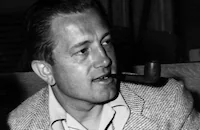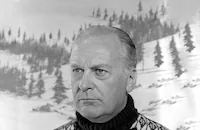The Blue Angel
Brief Synopsis
Cast & Crew
Edward Dmytryk
Curt Jurgens
May Britt
Theodore Bikel
John Banner
Fabrizio Mioni
Film Details
Technical Specs

Synopsis
In Lenzburg, Germany, in 1956, Professor Immanuel Rath, a stodgy, middle-aged botany teacher at the local boys school, becomes irate when his unruly students pass around a lurid postcard of cabaret singer Lola Lola. Rath traces the "vulgar dirt," as he terms it, to a place called the Blue Angel, and visits the club to confront the woman who is corrupting his students. Spotting several of his boys in the audience, Rath chases them backstage and comes face to face with the sultry Lola. When Lola begins to flirt with him, Rath become flustered and leaves his hat in her dressing room. The next morning, Rath finds himself distracted by thoughts of Lola, and after school that afternoon, returns to the club to reclaim his hat. When Rath unexpectedly appears, Kiepert, the manager of Lola's troupe, who also performs as a magician, shoos the professor's wayward students into the cellar before he can see them. Spying on the proceedings from a trap door, the boys delight in Rath's clumsiness as Lola gently teases him. When a drunken admirer stumbles into Lola's dressing room, Rath defends Lola from the drunk's crude advances, prompting the man to call the police. To avoid trouble, Kiepert hides Rath in the cellar, too. Shocked to find his students there, Rath indignantly pulls them up through the trap door and orders them to leave the club. After the police depart, Kiepert, relieved, offers Rath a drink, and soon the professor becomes inebriated and awakens the next morning in Lola's bed. Now smitten by Lola, Rath is crestfallen when he learns that the troupe plans to leave the next day. For the first time in his life, Rath is late for school, and upon entering the classroom, is greeted by jeers from his students, who have sketched drawings on the chalkboard depicting his infatuation with Lola. Harter, the school principal, who has been notified of Rath's inappropriate behavior, comes to Rath's classroom to chastise the professor for his actions. Defending himself against Harter's charges, Rath declares that he has finally found beauty with Lola and intends to marry her. When Harter cautions that marriage to Lola would be the ruin of his career, Rath immediately resigns from teaching. Returning to the Blue Angel, Rath presents Lola with an engagement ring and asks her to marry him. At first astonished, Lola warns that she has always been fickle in love and then accepts his proposal. Lola retires from the stage, but their marital bliss comes to an abrupt end when Rath is unable to find another job and is confronted with a mounting pile of bills. One day, Kiepert comes to town and offers Lola a starring role in the troupe. Although he opposes Lola's return to work, Rath, destitute, degrades himself by handing Kiepert the overdue rent bill to pay as an advance against his wife's services. Now reduced to selling suggestive postcards of Lola at her performances, Rath begins to drink heavily, and Kiepert chastises him for being kept by a woman. Three long years later, when the troupe's clown unexpectedly dies, Kiepert suggests that Rath take his place when they play the Blue Angel again. Rath refuses, aware that Kiepert intends to exploit the professor's notoriety to sell tickets. The troupe returns to Lenzburg, and at the train station, Lola encounters one of her former suitors, who watches in dismay as Rath works as a beast of burden, lugging his wife's baggage. When Rath sneaks back into the schoolyard, Harter finds him there and encourages him to break with Lola and return to teaching. Believing that his life as a teacher has ended forever, Rath defiantly refuses to leave Lola and accepts the clown job. Rath's appearance as a jester is widely publicized, drawing his old colleagues to the Blue Angel. On opening night, Rath sits dejected, wearing his clown makeup and tells Lola that Harter offered him a chance to return to teaching. When Kiepert drags the severely depressed Rath onstage, Lola, realizing that his only salvation is to leave her, embraces her former suitor in front of her husband. Insane with jealousy, Rath lurches offstage, bellowing, and attacks Lola. Witnessing the incident, Harter barges into Lola's dressing room, calms Rath and then leads him away.

Director

Edward Dmytryk
Cast

Curt Jurgens
May Britt

Theodore Bikel
John Banner
Fabrizio Mioni

Ludwig Stossel
Wolfe Barzell
Ina Anders
Richard [dickie] Tyler
Voytek Dolinski
Ken Walken
Del Erickson

Edit Angold
Carmen Austin
Ilse Burkert
Barbara Luna

Stella Stevens
Gene Roth
Siegfried Speck
Brian Avery
Paul Von Schreiber
Peter Muller
Hans Von Draing
Winona Smith
Otto Waldis
Franz Roehn
Hans Moebus
William Kirschner
William Kauffman
Norbert Schiller
Gary Spencer
Cosmo Sardo
Richard Richonne
John Bleifer
Gerry Gaylor
Crew
L. B. Abbott
Nigel Balchin
Adele Balkan
Jack Cummings
Leonard Doss
Ray Evans
Paul S. Fox
Hugo Friedhofer
James B. Gordon
Mack Gordon
Earle Hagen
Frederick Hollander
Jack W. Holmes
Harry M. Leonard
Jay Livingston
Lionel Newman
Ben Nye
Hermes Pan
Maurice Ransford
Joseph E. Rickards
Walter M. Scott
Leon Shamroy
Helen Turpin
E. Clayton Ward
Harry Warren
Lyle R. Wheeler

Film Details
Technical Specs

Quotes
Trivia
Notes
A December 1955 Los Angeles Times news item stated that Twentieth Century-Fox had quietly acquired the rights to the 1930 Ufa film The Blue Angel as a possible vehicle for Marilyn Monroe. The studio bought the rights from an alien property custodian after the German film was seized during World War II, according to a December 1959 Hollywood Reporter news item. That item also noted that Josef von Sternberg, the director of the German film [which was also released in an English-language version], sued Fox for misappropriation of property rights, claiming that he owned the rights to remake the picture. Von Sternberg charged that the 1959 film debased the original, which ended with "Rath" going mad and returning to his schoolroom to die. The outcome of the suit is unknown.
According to March and September 1958 Hollywood Reporter news items, Daniel Fuchs was initially hired to write the screenplay of the remake and Charles Vidor was to direct. An April 1959 Hollywood Reporter news item announced that Lou Jacobi was considered for the role of "Kiepert." The Variety review notes that exterior filming was done in Rothenburg, Bavaria. The Blue Angel was producer Jack Cummings first release for Twentieth Century-Fox.
The New York Times review scathingly commented that Swedish-born actress May Britt, who played "Lola," behaved "more like a ballet dancer in a Broadway musical than a sex pot in a smoky night club in Berlin," and that this depiction undermined the whole story, as did the happy ending. The Variety review added that one of the pictures shortcomings was its contemporary setting. According to a March 1957 Los Angeles Times news item, Ufa had wanted Marlene Dietrich, who starred as Lola in the 1930 version, to appear in a sequel. The sequel was never made, however. The song "Falling in Love Again" was used in the 1930s version and became Dietrich's signature tune.

Miscellaneous Notes
Released in United States 1959
Remake of the 1930 classic starring Marlene Dietrich.
2001 re-release features a restored print and re-formatted subtitles.
Film was originally shot in both a German and an English language version.
CinemaScope
Released in United States 1959











